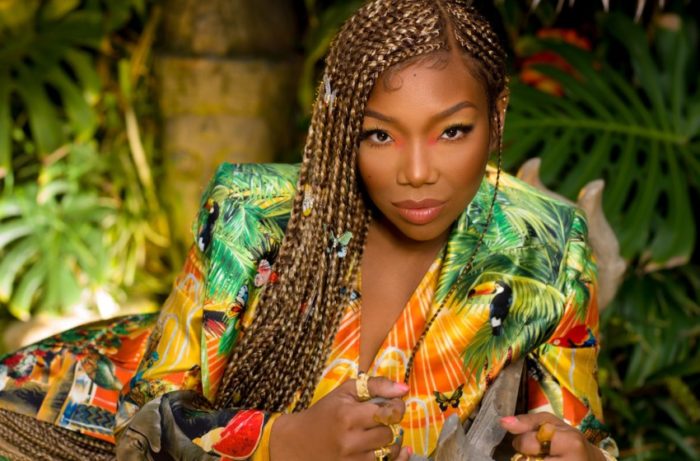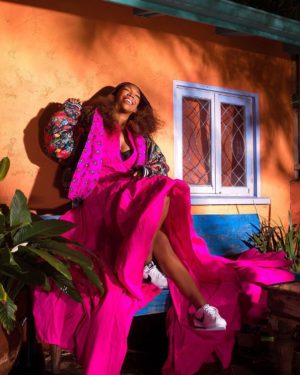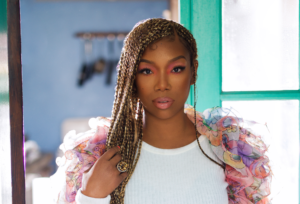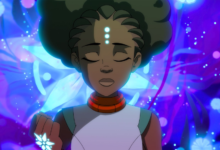
GRAMMY Award-winning singer/songwriter Brandy debuted at #1 on the Current R&B, the Current R&B/Hip Hop and the Independent Chart this week with her new album b7 via Brand Nu Entertainment/Entertainment One. The album also debuted at #4 on the Billboard Top Albums and the Top Current Charts.
“b7” was released on July 31st via Brand Nu & eOne, and is Brandy’s first studio album in 8 years. Executive produced by Brandy along with DJ Camper and LaShawn Daniels, this 15-track confessional is her most personal to date. The album features Daniel Caesar, Chance The Rapper and her daughter Sy’rai Smith. Other featured producers and writers include Hit Boy, Cory Rooney, Victoria Monét, Antonio “Tony” Dixon, Kim “Kaydence” Krysiuk among others.
UB Congratulates Brandy on her #1 album!
Stay Tuned for Our New Interviews With Brandy Next Week, as well as Sonja B. Norwood.
Today, we celebrate her #1 with featuring Brandy‘s official biography for “b7,” written by Gerrick Kennedy.

In the Good Book, the number seven symbolizes completion and perfection; exoneration and healing, and often accompanies the fulfillment of promises and oaths. Brandy’s seventh album is the manifestation of the singer’s hard fought journey towards liberation, healing, and the fulfillment of promises she made to herself long ago. Brandy is back, yes, but you’ve never heard her like this.
“I bare it all on this album,” she says. “I really don’t hold back anything.”
B7 is Brandy’s first release since 2012’s Two-Eleven and the eight year gap between projects—her largest hiatus—is the result of the singer/actress doing serious alchemy on herself after years of personal and professional turmoil put her in a dark place.
“I was feeling down and out, like I didn’t know my worth or my value and that is not a great place to be creatively or in life. And I had to muster up the strength to fight for myself. In moving forward I had to overcome a lot of things in my life that I had experienced and I had to rediscover who I am as a woman and who I am as an artist.”
It was a slow path towards self-discovery. Her acclaimed 2015 Broadway debut in Chicago helped the R&B legend regain her love of performing and being onstage. She rediscovered her voice, which she showcased on one-off singles like her fiery, trap-blues banger “Beggin & Pleadin” and the triumphant “Freedom Rings,” which saw her declaring her independence as an artist and was released last year to mark the 25th anniversary of her eponymous debut.
Brandy started to feel inspired again and was on a spiritual journey that she wanted to put on record and her newfound independence as an artist afforded her with an opportunity she hadn’t had in her career: Complete creative control.
“Because this was such a personal project for me, I wanted to make sure the music was right and the best for me—and it took a minute,” she says. “I was trying to find my sound … and get to a place where I could express myself as honestly as I could creatively.”
And she does just that on the album that she co-wrote and co-produced from top to bottom (another career first) over a three year period. B7 is a deeply confessional body of work she says helped her heal from the personal demons that have held her back.
It’s easy for some to overlook Brandy’s influence now. She dominated pop music in the ‘90s with her blend of hip-hop soul and contemporary R&B paired with a richly unique tone that led to genre purists hailing her as the “Vocal Bible.” We met has as a young girl from McComb, Mississippi and raised in Carson, California with a head full of braids and powerful gospel-raised voice. A generation of R&B fans can tell you exactly where they were the first time they heard “I Wanna Be Down” (UB founder Aries can) or saw her Bankhead bouncing in the middle of Times Square in her iconic “Baby” video.
By the time she was 19, Brandy was arguably a peerless pop star. Her groundbreaking sophomore album Never Say Never had catapulted her to higher heights as she was in our living rooms every week on Moesha. Brandy was the first black artist to be the face of CoverGirl, had a line of Barbie dolls, and was the first black woman to play Cinderella in a film—that she did all of this with micro braids down to her hips made her all the more inspirational for young Black women across the globe that had never seen this kind of Black girl magic. She continuously pushed creative boundaries on Full Moon and Afrodisiac but always found herself compared to her past commercial glories and lambasted for not matching her early successes or upholding the image of being a perfect, goody two–shoes that predicated her teenage stardom and followed her throughout her twenties.
 Somewhere along the way Brandy seemingly disappeared from the mainstream R&B conversation as artists worked to keep up with whatever trend was dominating the market. Even as younger generations of R&B, rap and pop stars found great inspiration in Brandy’s work and her voice, mainstream audiences didn’t gravitate towards efforts like Human and Two-Eleven.
Somewhere along the way Brandy seemingly disappeared from the mainstream R&B conversation as artists worked to keep up with whatever trend was dominating the market. Even as younger generations of R&B, rap and pop stars found great inspiration in Brandy’s work and her voice, mainstream audiences didn’t gravitate towards efforts like Human and Two-Eleven.
The Brandy that shows up on B7 is a woman that has reckoned with all the parts of herself that she’s suppressed and avoided, starting with the confidence that had slipped away after Two-Eleven. “When you’re faced with huge amounts of pressure and expectations, it can be tough to live up to,” the 41-year-old reflects. “I’ve overcome so much … And I honestly left my entire soul on this project. I feel like an elephant has lifted from my spirit.”
“Saving All My Love” sets the tone for B7. Over a lush, midtempo groove she addresses her lengthy hiatus and details the journey towards self-love and healing that provides the framework of the album. “Sorry for my tardy / Long time I was broken-hearted … and guarded / A target goddamn, can we let me live,” Brandy sings on the record that is also a nod to her hero, the late Whitney Houston.
“When it comes to love, and my experience, I haven’t experienced love at its best yet in my life, except for when I started to truly love myself,” she reveals.
“When I realized I am the one for myself and I’m not looking for love within someone else to complete me or make me whole, that’s when I started to overcome a lot of the demons in my own life—the things I’m not proud of that I have done or how I’ve handled things. I didn’t have the love I needed for myself. It sounds cliché, but it’s a real thing. I’ve taken the time to really be by myself and go into a God solitude with myself and confess and repent and keep it all the way real with myself so that I can move past the things that I have experienced and become a better version of me for me and my daughter.”
“Every day, I work on being a strong individual—not a perfect individual, a strong one. I work on my mental stability and well-being every day,” she says, her voice breaking with emotion. “At times it can be a struggle, but I’m here and I’m doing the work. When you do the work you feel encouraged and empowered that you can keep going.”
Brandy went back to basics for B7, assembling a small core team she would write and produce the entirety of the project with, anchored by DJ Camper and the late LaShawn Daniels, who helped pen some of her biggest hits including “The Boy Is Mine” and “What About Us” and passed away unexpectedly last year. Working with writers and producers that studied what she’d done in the past and could push her gave Brandy the confidence to completely shed herself.
“When I teamed up with DJ Camper, it seemed like the perfect fit. His tracks were so different, but still connected to me in a way where it didn’t feel so different from what I’ve done. It was almost like a continuation. When I would hear his music it was like, ‘This is what Never Say Never would sound like in the future,’” she says.
Brandy’s magic has always been her voice. The way she manipulates her tone, those honeyed riffs that seemingly go on for days and the way she stacks her harmonies have long been her hallmark and the reason why so many of us worship her voice. B7 marries the silky, smooth vibe she established on Never Say Never with the groundbreaking experimentation of Full Moon, albums that are revered as R&B blueprints for their use of multi-layered harmonies, unconventional song structures and forward-thinking electro-soul beats.
The 15-track confessional explores Brandy’s journey over the last few years, and how she came to be the resilient, spiritually grounded women she is today. She fantasizes about the simple pleasures of a kiss on the languid “Rather Be,” teams with her daughter Sy’rai on the empowering, high energy ladies anthem “High Heels,” questions a lover’s integrity on “Say Something” and powerfully confronts her struggles with her mental health on the metaphorical “Bye BiPolar.” The album also includes “Love Again,” her sultry duet with Daniel Caesar that has been a mainstay on R&B radio and scored the pair a Grammy nomination.
 “This project was a way for me to heal myself. It felt like being able to be as honest as I could. I was able to release a lot of agony and pain that I was feeling,” Brandy says. “It felt like I was coming clean. Not to anyone in particular, to me. I needed my music to be medicine for me. And I felt like if I can’t tell my story, then what am I doing this for? If I can’t heal myself the way I hope to heal others in music, then why am I doing it? What’s the point? It was healing to be as vulnerable as possible and it just makes me so proud that every song on this album is honest, and real.”
“This project was a way for me to heal myself. It felt like being able to be as honest as I could. I was able to release a lot of agony and pain that I was feeling,” Brandy says. “It felt like I was coming clean. Not to anyone in particular, to me. I needed my music to be medicine for me. And I felt like if I can’t tell my story, then what am I doing this for? If I can’t heal myself the way I hope to heal others in music, then why am I doing it? What’s the point? It was healing to be as vulnerable as possible and it just makes me so proud that every song on this album is honest, and real.”
Brandy is still discovering new textures to her voice, which will stun even her most ardent followers when they hear the new records, all of which were built around the complex melodies and harmonies she was coming up with in the studio. She points to a conversation with LaShawn Daniels while recording the heady love ode “Unconditional Oceans,” as a turning point. Which she produced with produced by DJ Camper and Alonzo “Lonnie” Smalls II.
“LaShawn was able to break me all the way down. There was point where I didn’t think I was getting the song and he said, ‘You have to remember your tone and the way you sound when you’re singing, it’s not about the harmonies or the range. It’s about your tone.’ It was moving because I never really got that until he said it,” she says. “I’ve never been the main writer on my projects, and I’ve never done songs from my own melody. And I was super moved, and inspired by the fact that I was basically penning a lot of the things that I was singing and it flowed like water. In that I found my sound: These melodies and lyrics that were coming from my own heart. It felt like the songs were writing themselves but it took me awhile to trust that it was it.”
Another breakthrough was recording the album’s second single “Borderline.” Over a hypotonic, downtempo groove produced with DJ Camper and LaShawn Daniels, she interrogates her relationship with love with searing honesty. It’s a darker, edgier flip on the traditional Brandy ballad and as revelatory as the song is, it’s her chilling vocal delivery that makes the song the centerpiece of the album.
“When I first heard the beat, it put me into a mood. I felt like the music told this amazing story,” she says of the record. “The melody was so me, but new. It was something I had never heard me do but it reminded me of a lot of the ballads I had done in the past. It touched me in such a way and it is one of my most favorite songs I’ve ever done.” She admits doubt got to her along the way. Between the pressure to deliver—especially considering how long she’s been gone from music—and doubting herself as a writer and producer she recorded a wealth of songs that she scrapped because they didn’t feel like her. Remembering the way she felt when listening to certain songs or the way others felt when she played them helped Brandy trust her intuition. The result led to her most cohesive album since Afrodisiac. But B7 is more than that, it’s a body of work that sees a woman finally at peace with herself.
“I’ve been able to hear all of my music back and live with it and I feel complete,” she says. “These are the songs that saved me. I’m no longer trapped in my story, or my own agony. All of the experiences I sing about on this album, are no longer a part of me in the way they once were. I feel like I went through all of the things I went through to sing the songs that are on this album. And I feel complete. Now that that’s done, I can get to higher purposes in my life.”
Brandy Showcases full Vulnerability and Truth in New ‘Borderline’ Visual & Single







You must be logged in to post a comment.